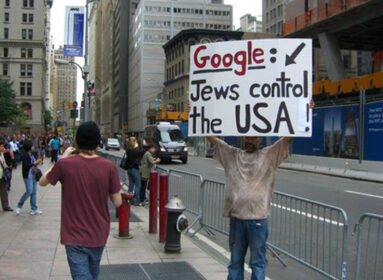 The Mandell JCC Hartford Jewish Film Festival confronts discrimination
The Mandell JCC Hartford Jewish Film Festival confronts discrimination
By Judie Jacobson
In the summer of 1952, Perry Brickman was home in Chattanooga, Tenn. after having completed his first year of dental school, when he received a letter from Emory University informing him that he was being dismissed from the school for academic reasons. In other words, he had flunked out.
The news came as a shock to Brickman, who until then had been a model student.
As it turns out, the same news came as a shock to the many other Jewish students who attended dental school at Emory during the years spanning 1948 to 1961. Like Brickman, they too were sent packing from Emory’s dental school ostensibly for academic reasons – but what was later revealed to be a systematic pattern of antisemitism orchestrated by the school’s dean, Dr. John E. Buhler.
In October 2012, a documentary film, recounting that 13-year period of discrimination in the history of Emory University – and produced by the university — was given an emotional screening at the school – followed by a public apology delivered by Emory’s president, Jim Wagner. More than 500 people attended the unprecedented event, including former students and family members.
The 30-minute film, “From Silence to Recognition,” is based on the investigative research of Dr. Brickman, now 80-years old and a retired oral surgeon. It will be screened at the Mandell JCC Hartford Jewish Film Festival on Thursday, April 11 at 6 p.m. at Criterion Cinemas in West Hartford’s Blue Back Square, together with a screening of the documentary “Reporting on the Times: The New York Times and The Holocaust.” The screening will be followed by a panel discussion with Brickman and Emily Harrold, director of “Reporting on the Times, moderated by Ken Jacobson, deputy national director of the Anti-Defamation League.
The Ledger spoke with Dr. Perry Brickman from his home in Atlanta about his experience at Emory, the making of the film, and Emory’s apology.
LEDGER: Why did you choose to go to Emory to begin with?
BRICKMAN: Emory was located in Atlanta which was only 120 miles from my home in Chattanooga. Atlanta also had a large and well-established Jewish population. So it was really a good choice. We had no idea that there was a Jewish quota at Emory – the undergraduate college. Only years later did I learn about that. The undergraduate life at Emory was ideal. The majority of my classmates were pre-med. I guess we should have suspected something sinister — it was well known that only four Jewish boys were accepted to Emory medical school each year. But, you know, we just sort of accepted that as the way things were. Because not many of us were pre-dent, it didn’t register that there was also a Jewish quota at the dental school.
After two years at Emory College I applied to and I was accepted to Emory University dental school, as well as to the University of Tennessee dental school in Memphis. But that school was over 300 miles away, way in the western part of Tennessee. Since I was already familiar with the Atlanta landscape and it was so much closer to home, for me Emory was the natural choice. I was treated well in the undergraduate school, so I had no reason not to expect to be treated well at the graduate school.
LEDGER: What was your reaction when you were sent packing?
BRICKMAN: Well, after my first year at dental school I returned home to Chattanooga. Within a week, I received a letter from the dean, Dr. John Buhler, advising me that I would not be allowed to return to school because of academic reasons. The hardest thing was having to show that letter to my parents. My mother’s reaction – and it was no different than the other mothers – was ‘what have you done to me?’ I grew up right on the spot – I can still relive that moment. I didn’t know exactly what I was going to do, but I knew I was going to do something. I wasn’t going to let it get me down.
I received the news with mixed emotion.
It was the first time I had ever been labeled a failure and obviously it was a huge disappointment as well as an embarrassment. But in some ways it was a relief because that dental school was like a prison camp; the instructors were like guards and we were the inmates. They were bullies.
I’m one of two people who were able to survive having been kicked out of the school during that 13-year period of time, because you were pretty much blacklisted after that. I was really lucky. I was able to get into the University of Tennessee dental school. There were four Jewish boys in my class; we came just a few years after Buhler had gotten there and we were the first that he really was able to target as a group. In two years all four of us were gone. One boy – Art Burns — got into Temple University. But it was painful. Bueller told him he was the worst boy in our class – he said “you’re number 72 out of 72.” He had to start all the way over and when he finished he was first in his class of over 100. I finished fourth in my class.
LEDGER: How did you find out the real reason behind your dismissal?
BRICKMAN: For many years I did not know that during Dean Buhler’s 13-year reign 65 percent of the Jewish boys were kicked out or had to repeat one or more years. It was not until 2006 that I became acquainted with the Anti-Defamation League (ADL) book called Some of My Best Friends which describes discrimination and antisemitism in the United States in the 20th century. The eleventh chapter of that book is entitled “The Graduate Schools” and it details the antisemitism that occurred at the Emory University dental school between 1948 and 1961, under Dr. Buhler’s guidance. It was published in 1962, the year after he left.
They were able to write about this because of one man: the ADL’s southeastern director, Arthur J. Levin. He was determined to expose the truth of what was happening at the Emory dental school. It’s an incredible story about how he accumulated the data. Many of the Jews there were reluctant to talk. But he believed the boys who were telling him the stories. And Emory was denying it all the time. Finally, the dean came up with a new application form for the dental school that, in addition to asking your religion, asked your race and gave you three choices: Caucasian, Jew or other. That was the straw that broke the camel’s back. Some student gave it to Mr. Levin; he took it to the school. Two weeks later the dean resigned. Emory continued to say that there was no substantiation to the Jewish stuff and that Buhler had acted alone.
LEDGER: What was your reaction when you read about this?
BRICKMAN: When I saw that book – when I learned what happened – it was a shock. I couldn’t put that book down. On page 170 there was a comparative analysis of Emory’s dental students – a bar graph which illustrates the 65 percent of Jewish students who failed during Dr. Buhler’s tenure as dean. But they were just statistics. Who were they? There I was reading the book 54 years later, in 2006, wondering who were these men? I was obsessed with the realization that so many people had suffered the same experience and no one had sought to identify them as individuals – only as statistics.
So, I decided to go to the library at Emory and I went into the yearbooks to determine who the Jewish students were back then through the names or class pictures. So, for example, I would see someone with a Jewish name in the first year but not the second year and I knew he might be one. There were many surprises — I saw many names and faces that I knew. So I decided in 2006 I really wanted to do something. I was already retired. I developed a plan to interview the former students but, guess what, nobody wanted to talk. I was told “Stop, it’s over.” As it turned out, most of them had suppressed their experience. Many had never shared their stories with their wives, children or business partners. They were reluctant to reopen old wounds. My wife described us as a “fraternity of silence.”
Finally, one man who had been kicked out and went on to medical school in Florida and became a well known gastroenterologist was willing to talk. I did an interview with him and he was fabulous…and then I did another, and another and another.
Finally, after four more years of research, I had enough to produce a movie on my computer.
LEDGER: How did your film lead to the apology from Emory?
BRICKMAN: I showed the film to several prominent Emory alumni and faculty – including [Professor] Deborah Lipstadt, who I had helped recruit from the West Coast. They were moved to share it privately with Emory University officials who were stupefied and said, “This is not Emory today.” But they wanted to do a public apology. On Oct. 10, 2012, Emory President James Wagner made a private apology to the former students and their families. About 150 showed up: the widows and kids of former students who had already died; people who swore they would never step foot on the Emory campus. One died two days later, but not before hearing the apology he thought he would never receive. Then, we walked down the block to the public event. They thought about 200 were coming and had set up for 250. There were almost 500 people there. The room was packed.
The school comissioned a well-respected filmmaker to produce a documentary, using some of my interviews. The move is called “From Silence to Recognition” and is about 30-minutes. It was very well received. They had the people from the ADL there.
In 1962 when the ADL book came out, Art Levin was vilified by everybody here in town. They said “why are you doing this, it’s over.” And he said “It’s not over.” Finally, he quit and moved to Washington. When I located him all these many years later in Coral Gables, he said “I just did my job.” Of course, he’s a hero now. So, Emory went down there and interviewed him for the film. He’s incredible – he’s 95 and it just gave him a whole new life.
LEDGER: Have you been in touch with any of the classmates?
BRICKMAN: I’ve been in touch with all of them since I started to do this thing. There are a few who still are reticent; one or two were hurt so badly they just can’t handle it. One of them is a judge – he is successful, but he’s wounded. He was provisionally accepted to a dental school in Nebraska, subject to Buhler’s changing just one thing on the record to indicate that he did okay on something in particular. Buhler wouldn’t do it and so he didn’t get in.
LEDGER: Why do you feel this is an important story to tell?
BRICKMAN: You know I didn’t even realize how important a story it is – but it certainly has resonated with many people.
I think there is a lesson here of what can happen when a complacent public gives free rein to a powerful institution. In this case, the Atlanta Jewish community was extremely reluctant to confront a respected university from which many of their members had graduated. Emory had the upper hand, and they willfully took advantage of their powerful position. Thank God, Art Levin was determined to expose the truth of what was happening at the Emory Dental school. Though vilified by both sides, he persevered and saw to it that justice would prevail.
Today, most people understand the word “quota” to mean an affirmative action quota—- a minority preference. In retrospect, there is reason to question whether these quotas were helpful or harmful. However, there is no doubt that they were well-meaning efforts to level the playing field.
Exclusionary quotas, known as “numerus clausus,” began in Europe, and spread to the United States in the early part of the twentieth century. They were directed principally toward Jews, and were adopted by the most respected universities. This story serves to educate the public about the origin of quotas, and the pernicious and divisive effect they had on our society.
I have to give Emory enormous credit. They’re the only school – the only big institution – that’s ever really truly apologized for what they did by saying, “We’re sorry that it happened and we’re sorry that it took us so long to get the record straight.”
For tickets call the Film Festival box office at (860) 231-6316, email tickets@mandelljcc.org. or visit the JCC at 335 Bloomfield Ave., West Hartford.
For information on the Hartford Jewish Film Festival visit www.hjff.org.
Comments? . judiej@jewishledger.com








 Southern New England Jewish Ledger
Southern New England Jewish Ledger










